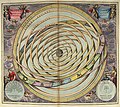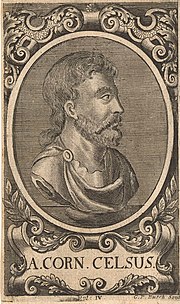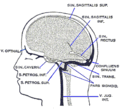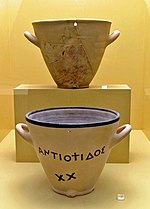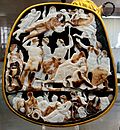time, Herophilos stated that diseases occurred when an excess of one of the four humors impeded the pneuma from reaching the brain. Herophilos also introduced...
13 KB (1,693 words) - 16:19, 28 November 2024
states that Herophilos of Alexandria vivisected some criminals sent by the king. The early Christian writer Tertullian states that Herophilos vivisected...
26 KB (2,960 words) - 16:19, 11 October 2024
saw the choroid from dissections of animal eyes. About 100 years later, Herophilos (c. 335 – 280 BCE) also described the choroid from his dissections on...
8 KB (958 words) - 18:53, 27 May 2024
motor neuron disease. The first recorded description of the nerve was by Herophilos in the third century BC. The name hypoglossus springs from the fact that...
25 KB (2,619 words) - 03:14, 20 November 2024
antiquity. Human dissection was practiced, mostly by Herophilos and Erasistratus; Praxagoras was Herophilos' teacher. Although the university in Alexandria...
6 KB (794 words) - 03:52, 29 October 2024
saint of Chalcedon Boethus of Chalcedon (2nd century BC), Greek sculptor Herophilos (2nd century BC), Greek physician Phaleas of Chalcedon (4th century BC)...
15 KB (1,360 words) - 21:19, 28 October 2024
ailments - instead of the reproductive physiology that was studied under Herophilos. von Staden, Heinrich (1989). Herophilus: The Art of Medicine in Early...
826 bytes (69 words) - 12:18, 22 August 2023
Alexandria School of Medicine (section Herophilos)
and doctors of the Alexandria School were Herophilos and Erasistratus.[citation needed] Although Herophilos (c. 300 BC) is considered to be the founder...
13 KB (1,767 words) - 07:18, 14 August 2024
The first mention of lymphatic vessels was in the 3rd century BC by Herophilos, a Greek anatomist living in Alexandria, who incorrectly concluded that...
61 KB (7,115 words) - 17:39, 9 January 2025
ancient Greece started under Ptolemaic kings due to their link to Egypt. Herophilos, through his work by studying dissected human corpses in Alexandria, is...
22 KB (2,564 words) - 17:10, 5 November 2024
century Herophilos in Alexandria was one of the first anatomists to perform dissections of the human body for the brief time that it was legal. Herophilos discovered...
26 KB (3,869 words) - 03:25, 22 November 2024
called Φλέβες, phlebes. The word arteria then referred to the windpipe. Herophilos was the first to describe anatomical differences between the two types...
19 KB (2,310 words) - 19:58, 16 January 2025
one of the most accomplished of all medical researchers of antiquity Herophilos, physician, one of the earliest anatomists Dioscorides, physician, pharmacologist...
12 KB (1,229 words) - 19:54, 8 December 2024
the difference between arteries and veins. Also in the 4th century BCE, Herophilos and Erasistratus produced more accurate anatomical descriptions based...
79 KB (8,838 words) - 14:32, 20 January 2025
sculptor Praxiteles ends his active career in Athens (approximate date). Herophilos, Greek physician and first anatomist (d. 280 BC) Hicetas of Syracuse,...
3 KB (374 words) - 14:15, 26 December 2020
tradition. Praxagoras theorized that blood traveled through the veins, while Herophilos and Erasistratus performed dissections and vivisections of humans and...
154 KB (19,477 words) - 19:23, 14 January 2025
vivisection of human beings took place for the first time in the work of Herophilos and Erasistratus. Anatomical knowledge in antiquity would reach its apex...
66 KB (8,269 words) - 21:36, 6 December 2024
first use of human bodies for anatomical research occurred in the work of Herophilos (335–280 BC) and Erasistratus (c. 304 – c. 250 BC), who gained permission...
51 KB (6,342 words) - 14:23, 29 October 2024
nerve nets. These are found in Cnidaria, Ctenophora and Echinodermata. Herophilos (335–280 BC) described the functions of the optic nerve in sight and the...
23 KB (2,629 words) - 18:00, 16 December 2024
Philalethes, a contemporary of Aristoxenus, and a follower of the teachings of Herophilos. He succeeded Alexander as the head of the Herophilean school of medicine...
3 KB (306 words) - 22:54, 28 July 2024
and human experimentation. Celsus discusses, for example, the case of Herophilos and Erasistratos, who he asserts practised vivisection. In the treatment...
10 KB (1,226 words) - 19:13, 5 December 2024
older, and describes the veins as a gutter or canal. This is named after Herophilos, the Greek anatomist who first used cadavers for the systematic study...
6 KB (613 words) - 15:07, 8 May 2024
Slightly later, in the early 3rd century BC, the Hellenistic physician Herophilos employed a portable clepsydra on his house visits in Alexandria for measuring...
42 KB (5,082 words) - 16:37, 10 January 2025
lived around the 1st century BC. He was a follower of the teachings of Herophilos, and studied at the celebrated Herophilean school at the village of Men-Carus...
2 KB (200 words) - 16:03, 22 March 2023
Hippocrates and was a native of Tanagra in Boeotia. He was a follower of Herophilos, and a contemporary of Philinus. Therefore, he must have lived in the...
1 KB (149 words) - 04:50, 27 October 2024
with laurel wreath is probably of Emperor Tiberius. The work is signed Herophilos Dioskourid[ou] ('Herophilus, son of Dioscorides'). The colour of the glass...
22 KB (2,748 words) - 20:55, 1 November 2024
physician and patient. Hippocrates is also known as "the Father of Medicine". Herophilos (335–280 BCE) was the first to base his conclusions on dissection of the...
207 KB (23,280 words) - 08:12, 6 January 2025
of them in historical review. Hippocrates (the "father of medicine"), Herophilos, Erasistratus and later Galen studied at the temple of Amenhotep, and...
51 KB (4,234 words) - 11:11, 22 December 2024
nerve cells directly, with signals from a digital camera. Around 300 BCE, Herophilos identified the retina from dissections of cadaver eyes. He called it the...
84 KB (9,299 words) - 13:58, 2 November 2024
dynasty king of Macedon (d. 283 BC) 336 BC Demetrius I of Macedon 335 BC Herophilos, Greek physician and first anatomist (d. 280 BC) 334 BC Zeno of Citium...
286 bytes (4,004 words) - 23:01, 8 October 2021














